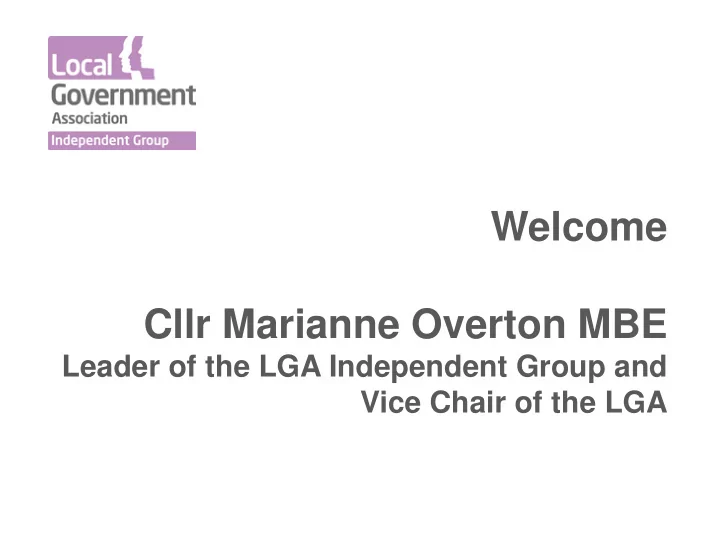

Welcome Cllr Marianne Overton MBE Leader of the LGA Independent Group and Vice Chair of the LGA
The LGA: The Year Ahead Cllr James Jamieson Chairmen, LGA Mark Lloyds Chief Executive, LGA
The changing nature of British politics Tony Travers London School of Economics & Political Science
The decline of the ‘two party’ system has occurred gradually since the 1960s • ‘Con & Lab’ vote is in long -term gradual decline • 2017 showed a sudden reversal of this trend, almost certainly because of a Brexit ‘overlay’ of traditional party voting • 2019 proved a remarkably successful one for Liberal Democrat and Independent councillors • In Scotland and Wales, SNP and Plaid Cymru have eaten into the ‘two party’ vote • The use of PR voting in sub-national and EU elections has encouraged wider voting choices • The recent Parliament saw a profusion of ‘independents’ • Identification with parties is also in long-term decline
Vote share of two largest parties; all other parties 1950 to 2019 general elections 1955 Con & Lab = 96% Recent opinion poll average for 2019 Con & Lab = 63-64%
Party affiliation of councillors (GB) - 1973 to 2019
Local election results 2019 Source: BBC
MPs at dissolution of Parliament
Council mayoral elections 2019 Source: House of Commons Library
SNP and Plaid Cymru vote shares 1929 to 2015 general elections Source: David Sanders, Journal of the British Academy 5, 91 – 124. DOI https://doi.org/10.5871/jba/005.091
Councils controlled and councillor numbers England Wales PR Scotland makes a difference
Decline of party identification - 1964 to 2015 Source: David Sanders, Journal of the British Academy
Identification with the major parties - 1964 to 2015 Source: David Sanders, Journal of the British Academy
The future - 1
The future - 2 • There is no evidence that the fragmentation of the ‘two party’ vote is slowing down • If anything, Brexit may hasten further shifts of loyalty and voting • Voters shift party from election to election far more than in the past • It is possible the traditional parties can re-align themselves and halt fragmentation and decline, or that independent MPs and councillors will grow in number • ‘Independents’ remain independent and thus can benefit from these changes but cannot really plan to do so • Or can they?
The changing nature of British politics Tony Travers London School of Economics & Political Science
Climate Emergency: What next? Dr Ian Smith Dr Louise Reardon (apologies)
Read More Read More
The Climate Change Presentation by Ian Smith Challenge: Senior Lecturer and Programme what is the scope for local government Leader for Business Management & Economics action? 8, November 2019
Who am I? Why am I out front here? The science of climate change is clear and • unambiguous The political and technical solutions that can o generate sufficient consensus are less clear My ‘claims’ on knowing stuff: • Research on how institutional partnerships work o (eg multi-agency, interdependent partnerships) around multi-sectoral problems Research on how climate change solutions are o framed by social structures/practices (ie how people live in your area) Research on what motivates people to engage in o collective action on climate change responses
Collective action problems 1. How do you manage ‘collective goods’/the ‘commons’ i. “benign climate” is a collective good ii. Free riding/cheating 2. Dissonance issues – who consumes (carbon), who pays (for consequences) i. Geographic (within and across areas) ii. Time (inter-generational) iii. Problematic for politics of ‘local’ government 3. “Wicked” or “complicated” problem(s)? 4. None of this is an excuse for doing nothing
• Climate change impacts
Broad areas of potential LG action 1. Reduce the climate impact of ‘own’ operations 2. Reduce the climate impact of all activities within your area: i. Regulating function ii. Leadership function 3. Reduce fuel poverty in your area 4. Prepare your area for the changes that are inevitable i. Build resilience ii. Avoid creating future problems
Conclusions (SNACC): ways forward What are ‘no regrets’ possibilities? • Do not frame approach around ‘climate change’ • Target areas with historic environmental vulnerability • flooding/overheating Think about adaptation and mitigation at the same time •
For more information For suburban adaptation to climate change (SNACC project): • o https://www.arcc-network.org.uk/snacc/ For understanding why people self organise on climate change issues • (SELFCITY project): o https://selfcity-project.com/en/
What is the role of Local Government in Provincial England in 2020s on climate related issues? Which of the headings are you working under? • How do you balance ‘stewardship’ vs as ‘political mandate’? • Do you lead as ‘climate justice champion’ or as ‘parsimonious • manager’? Do you frame/co- opt ‘civic society’ or listen to it (outside of election • time)? What is right balance of local control vs common regulation? •
Lunch Cllr Marianne Overton MBE Leader of the LGA Independent Group and Vice Chair of the LGA
Workshops 2.30pm 3.45pm In Administration Bevan Hall Sm Sq 1 & 2 Working with the Media Being effective in Administration In Opposition Sm Sq 1 & 2 Bevan Hall Effective Opposition Working with the Media
Speaker’s Corner Cllr Clive Woodbridge Deputy Leader of the LGA Independent Group and Deputy Chair of the LGA
Close Cllr Marianne Overton MBE Leader of the LGA Independent Group and Vice Chair of the LGA
Recommend
More recommend